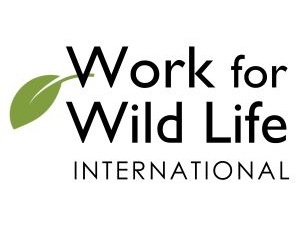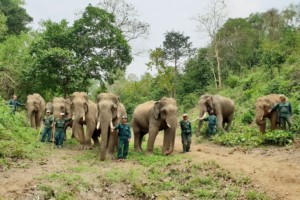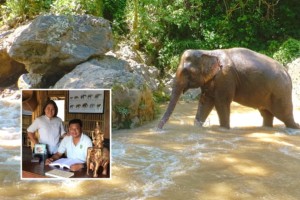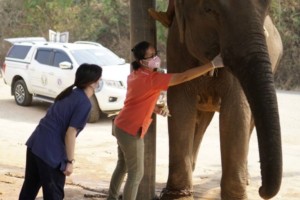Keeping elephants healthy under the cloud of COVID-19
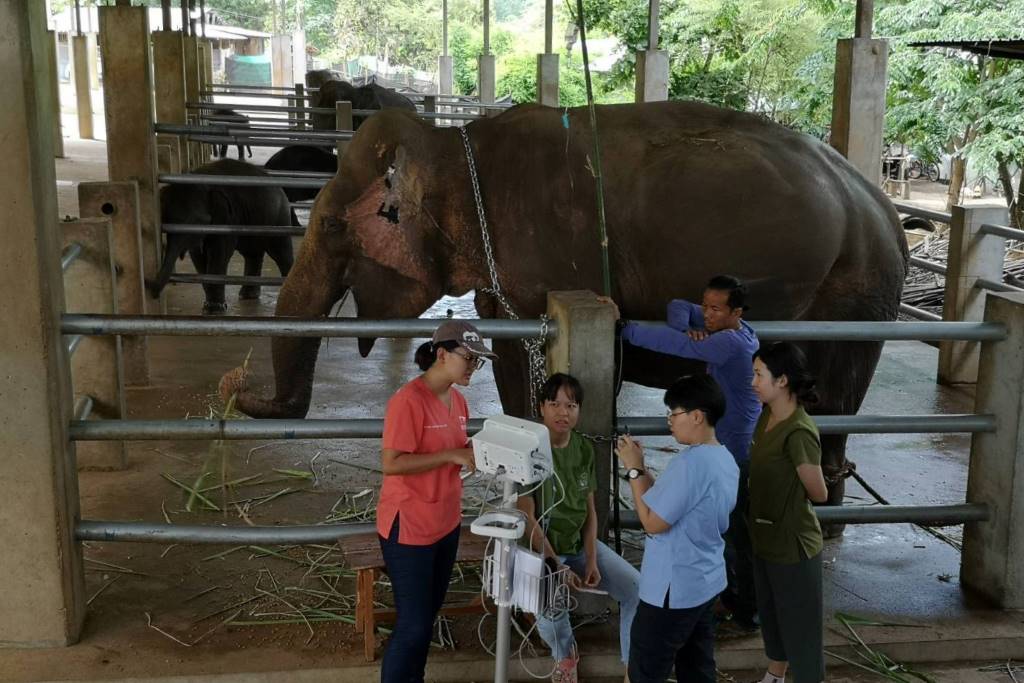
News from the field — from the Elephant Healthcare Emergency Lifeline Fund in Chiang Mai, Thailand — by Hollis Burbank-Hammarlund of Work for Wild Life International.
What’s the saying? An ounce of prevention is worth a pound of cure?
For Thailand’s tourism elephants confined to lock-down mode — along with the facilities and people who care for them — the need for routine and emergency elephant healthcare services remains constant.
Confinement during the global COVID-19 pandemic causes its own stressors on captive elephants: Constipation from low quality food, lameness and wounds from immobility and unsafe environments, and the emotional stress (like humans) of isolation.
For Thai elephant camps and sanctuaries, money is tight these days due to the precipitous drop in tourism income. Cutbacks to food and healthcare are constant threats to elephants’ well-being. Living on the edge of wellness is not a good place for any elephant. Worry is warranted as captive elephants are large, sentient animals with big appetites and special needs that require extra care even in the best of times.
That’s why a team of NGOs from around the globe are working together — supported by a cadre of kind donors — to underwrite the cost of elephant veterinary and vet technician services for the duration of the pandemic. We’re keeping ele-healthcare professionals on the job helping elephants!
The “Elephant Healthcare Emergency Lifeline Fund” is being organised and implemented by US-based Elephant Care International and Work for Wild Life International, along with Thai-based Golden Triangle Asian Elephant Foundation (GTAEF).
–> CLICK/TOUCH HERE to DONATE <–
Call the doctor!
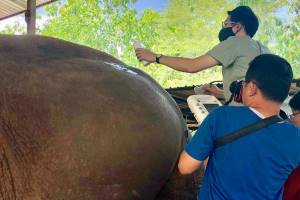
The female elephant seen in the featured image above is just one case among many examples of the good work being carried out every day to ensure Thailand’s tourism elephants remain safe and healthy.
A new mother in her 30s, she had become thin while taking care of her calf; she showed clear signs of ventral edema and an enlarged abdomen. Her owners called for help.
Dr Wachiraporn Toonrongchang (DVM) reached out to her colleagues from The Elephant Hospital at Lampang, Nation Elephant Institute; The Center for Elephant and Wildlife Research, Chiang Mai University; and the Thai Elephant Alliance Association. Working together, the team of veterinarians examined the elephant and found she has hypoproteinemia (low blood protein) and was excreting proteins in her urine.
The elephant is currently being cared for under close surveillance and is in good hands, thanks to the teamwork and financial support of so many people who care.
Would you like to support the “Elephant Healthcare Emergency Lifeline Fund”?
–> CLICK/TOUCH HERE to DONATE <–
Special thanks to Dr Nissa Mututanont (DVM) of the Golden Triangle Asian Elephant Foundation (GTAEF) in Chiang Rai, Thailand for her assistance with writing this article and for providing the photos.
Featured image (top of post): Dr Wachiraporn Toonrongchang (DVM) and team at a private camp in Chiang Mai, Thailand. Image supplied by Dr Nissa Mututanont of the GTAEF.
About the author

As Founder & Director of “GT” Insight Partner Work for Wild Life International, Hollis Burbank-Hammarlund telecommutes from her home office in Vermont, USA and travels to Asia for onsite work. As a project developer, fundraiser, and logistics manager, she teams up with NGOs and experts from all around the globe to support wildlife conservation and animal welfare initiatives in Indonesia, Nepal, Vietnam, Myanmar, Sri Lanka, and Thailand, with a focus on endangered elephants and orangutans.
Recent elephant-related projects include the Elephant Healthcare Emergency Lifeline Fund (2020); “Everything Elephants” (2019); ElephantCARE ASIA Workshop (2018); and EleVETS Training Program — Sri Lanka (2017). From 2011 – 2013, Hollis helped raise nearly US$750,000 to purchase and permanently protect the Rawa Kuno Legacy Forest — 7,900 acres of at-risk orangutan habitat in Borneo.


